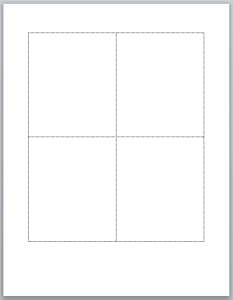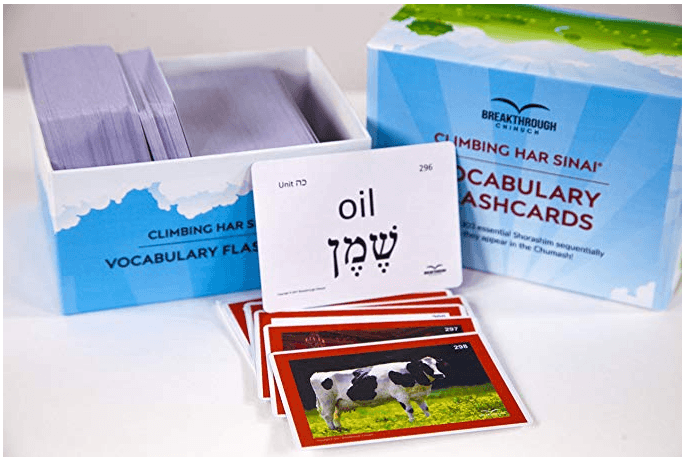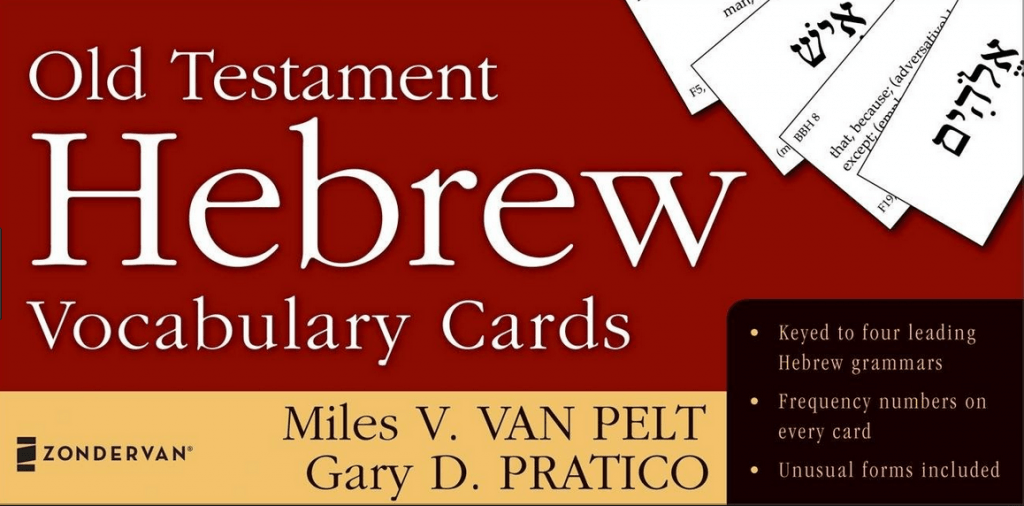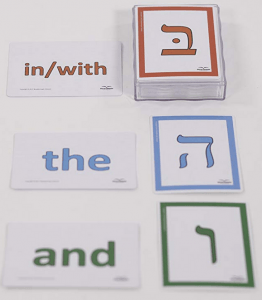Written by: Sarah Smith
 Hebrew packs a lot of meaning into one word. The word לַַיַּבָּשָׁה (lä-bä-shä) once “undecorated” of all its prefixes and suffixes, (that include a preposition, the article, and the feminine noun identification), reduces to the root word יָבֵשׁ (yä-vāsh) meaning “to be dry”. You might have drilled every Prefix and Suffix until you can recognize them blindfolded, but if you do not know the root word when it stands before you bare, you will never be comfortable reading your Hebrew Bible. Vocabulary memorization is the FOUNDATION that must be solid for your understanding to be able to rise high. The particular system of memorization is not as important as FAITHFULNESS. It takes regular laying of the vocabulary blocks to build toward the final goal of fluent reading of Hebrew.
Hebrew packs a lot of meaning into one word. The word לַַיַּבָּשָׁה (lä-bä-shä) once “undecorated” of all its prefixes and suffixes, (that include a preposition, the article, and the feminine noun identification), reduces to the root word יָבֵשׁ (yä-vāsh) meaning “to be dry”. You might have drilled every Prefix and Suffix until you can recognize them blindfolded, but if you do not know the root word when it stands before you bare, you will never be comfortable reading your Hebrew Bible. Vocabulary memorization is the FOUNDATION that must be solid for your understanding to be able to rise high. The particular system of memorization is not as important as FAITHFULNESS. It takes regular laying of the vocabulary blocks to build toward the final goal of fluent reading of Hebrew.
Flashcards Anyone?
This set of 300 biblical Hebrew vocabulary cards is slightly expensive, but they are worth the investment. The chosen words constitute 80% of the vocabulary in Genesis, (called “Chumash Bereshis” in the item description that I have linked to) which is 65% of the words in the whole Torah, (first five books of the Hebrew Bible). Some of the pictures have a definite Jewish theme, which may or may not be what you are looking for. There are a few pictures that seem disconnected from the meaning they are supposed to represent, but, on the whole, a wonderful set pursuing an excellent concept.
Mastery of this set provides an excellent foundation for beginning a read-through of the books of Moses. I am a great believer in using pictures to pair a concrete image or idea with a new vocabulary word. This is how little children first learn their native tongue, and it is a very effective memorization tool. My husband objects that a picture limits the linguistic scope of a word too much, but we compromised by beginning our children with picture flash cards and, once the words are in their memory, switching to word cards like the set below.
1,000 cards that are numbered, (in case a little child dumps them out and you want to re-organize them) with card number 1 being the most frequently used word in the Hebrew Bible. Memorizing from the beginning of the set gives you the most reading-reaping for the labor sown. 
We took our cards to an office supply store and had them laminated. We then punched holes in them and hung them on loose leaf binder rings, fifty cards to a bunch. Lucas created a “Jacob’s Ladder” on a beam in our living room, (out of reach of little hands).
Without negating anything I said at the start of this page about the importance of recognizing root words, it is also helpful in reading Hebrew to know at a glance what prefixes and suffixes are on a word and what meaning they add to the root word. This set helps with drilling the “decorations”. Created by the same company that sells the picture cards above, these cards have the English translations on the back. There is another set of grammar cards on Amazon that is identical to this, but it is more expensive and the translations are on separate cards.
Homemade Vocabulary Picture Cards
In the Smith home, our first Hebrew vocab cards were homemade picture cards. If you are using A Primer for Biblical Hebrew, it contains 77 picture cards to get you started. One page of them looks like this:
I still make vocabulary picture cards as the children add new words to their memorization rotation. Here is my method: I have a Microsoft Word document split into two columns with a template created from dashed lines, (shown at left).  I copy and paste the template to new pages as needed. I image search in Google for “[vocab word] coloring page” and copy whichever image best suits the word. Paste that image into a box in the template, (you do not have to worry about copyright infringement for home use). Click to select the image and follow these steps: Picture tools→Format→Wrap Text→ Behind Text. This allows you to drag the image around the page and center it within the dotted lines, resizing as necessary. When a page is full, I print it and cut out the flash “cards”, writing the definition on the back.
I copy and paste the template to new pages as needed. I image search in Google for “[vocab word] coloring page” and copy whichever image best suits the word. Paste that image into a box in the template, (you do not have to worry about copyright infringement for home use). Click to select the image and follow these steps: Picture tools→Format→Wrap Text→ Behind Text. This allows you to drag the image around the page and center it within the dotted lines, resizing as necessary. When a page is full, I print it and cut out the flash “cards”, writing the definition on the back.
Computer Cards
The website of Bill Mounce, (author of the popular Greek grammar Basics of Biblical Greek) offers a free software program called Flashworks. It has 409 Hebrew vocabulary “flashcards” that have several interesting features, (below is a screenshot).

1. If you choose, it will pronounce the words.
2. You can personally rate words according to difficulty and then focus on just the words that are tricky for you.
3. You can organize words into Right and Wrong “piles” and then just review the words you got wrong.
The website’s directions for downloading the program are very clear, and the Flashworks tutorial is also very informative.


